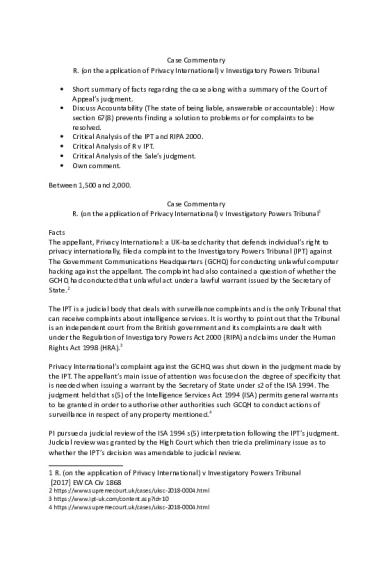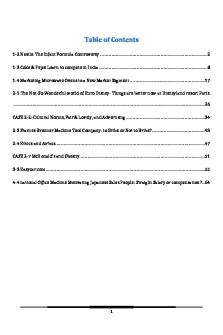Case Commentary - Privacy International PDF

| Title | Case Commentary - Privacy International |
|---|---|
| Author | Fares Alsayed |
| Course | A Critical Introduction to Law |
| Institution | University of Kent |
| Pages | 2 |
| File Size | 51.1 KB |
| File Type | |
| Total Downloads | 70 |
| Total Views | 169 |
Summary
Download Case Commentary - Privacy International PDF
Description
Case Commentary R. (on the application of Privacy International) v Investigatory Powers Tribunal
Short summary of facts regarding the case along with a summary of the Court of Appeal’s judgment. Discuss Accountability (The state of being liable, answerable or accountable) : How section 67(8) prevents finding a solution to problems or for complaints to be resolved. Critical Analysis of the IPT and RIPA 2000. Critical Analysis of R v IPT. Critical Analysis of the Sale’s judgment. Own comment.
Between 1,500 and 2,000. Case Commentary R. (on the application of Privacy International) v Investigatory Powers Tribunal1 Facts The appellant, Privacy International: a UK-based charity that defends individual’s right to privacy internationally, filed a complaint to the Investigatory Powers Tribunal (IPT) against The Government Communications Headquarters (GCHQ) for conducting unlawful computer hacking against the appellant. The complaint had also contained a question of whether the GCHQ had conducted that unlawful act under a lawful warrant issued by the Secretary of State.2 The IPT is a judicial body that deals with surveillance complaints and is the only Tribunal that can receive complaints about intelligence services. It is worthy to point out that the Tribunal is an independent court from the British government and its complaints are dealt with under the Regulation of Investigatory Powers Act 2000 (RIPA) and claims under the Human Rights Act 1998 (HRA).3 Privacy International’s complaint against the GCHQ was shut down in the judgment made by the IPT. The appellant’s main issue of attention was focused on the degree of specificity that is needed when issuing a warrant by the Secretary of State under s2 of the ISA 1994. The judgment held that s(5) of the Intelligence Services Act 1994 (ISA) permits general warrants to be granted in order to authorise other authorities such GCQH to conduct actions of surveillance in respect of any property mentioned.4 PI pursued a judicial review of the ISA 1994 s(5) interpretation following the IPT’s judgment. Judicial review was granted by the High Court which then tried a preliminary issue as to whether the IPT’s decision was amendable to judicial review. 1 R. (on the application of Privacy International) v Investigatory Powers Tribunal [2017] EWCA Civ 1868 2 https://www.supremecourt.uk/cases/uksc-2018-0004.html 3 https://www.ipt-uk.com/content.asp?id=10 4 https://www.supremecourt.uk/cases/uksc-2018-0004.html
The Divisional Court (DC) judgment concluded that the IPT’s decision was not amenable to judicial review. IP were granted a permission to appeal to the Court of Appeal. Issue(s) The main and central issue of the the case referred to the Court of Appeal was straight forward. It was a question of whether s67(8) of RIPA 2000 prevents a judicial review of a decision made by the IPT or not.5 S67(8) of RIPA 2000 states that: “Except to such extent as the Secretary of State may by order otherwise provide, determinations, awards, orders and other decisions of the Tribunal (including decisions as to whether they have jurisdiction) shall not be subject to appeal or be liable to be questioned in any court.”6
Judgment Lord Justice Sales stated that he “found that the case turned on a short point of statutory construction in relation to RIPA 2000.7 He also included in his judgment that the statutory language used in s67(8) in RIPA 2000 was clear and direct, specifically when it is reviewed within its legislative context.8 Case Analysis
5 https://www.supremecourt.uk/cases/uksc-2018-0004.html 6 RIPA 2000 7 Case 24-25 8 Case 26...
Similar Free PDFs

Case Commentary – R v Jogee
- 7 Pages

Privacy Essay
- 2 Pages

Privacy - cdcdcdcdc
- 21 Pages

Biweekly Blog 5 - Privacy
- 3 Pages

Privacy Notes Maynard
- 3 Pages

Discussion privacy part II
- 2 Pages

Privacy tools - aboutconfig
- 4 Pages
Popular Institutions
- Tinajero National High School - Annex
- Politeknik Caltex Riau
- Yokohama City University
- SGT University
- University of Al-Qadisiyah
- Divine Word College of Vigan
- Techniek College Rotterdam
- Universidade de Santiago
- Universiti Teknologi MARA Cawangan Johor Kampus Pasir Gudang
- Poltekkes Kemenkes Yogyakarta
- Baguio City National High School
- Colegio san marcos
- preparatoria uno
- Centro de Bachillerato Tecnológico Industrial y de Servicios No. 107
- Dalian Maritime University
- Quang Trung Secondary School
- Colegio Tecnológico en Informática
- Corporación Regional de Educación Superior
- Grupo CEDVA
- Dar Al Uloom University
- Centro de Estudios Preuniversitarios de la Universidad Nacional de Ingeniería
- 上智大学
- Aakash International School, Nuna Majara
- San Felipe Neri Catholic School
- Kang Chiao International School - New Taipei City
- Misamis Occidental National High School
- Institución Educativa Escuela Normal Juan Ladrilleros
- Kolehiyo ng Pantukan
- Batanes State College
- Instituto Continental
- Sekolah Menengah Kejuruan Kesehatan Kaltara (Tarakan)
- Colegio de La Inmaculada Concepcion - Cebu








